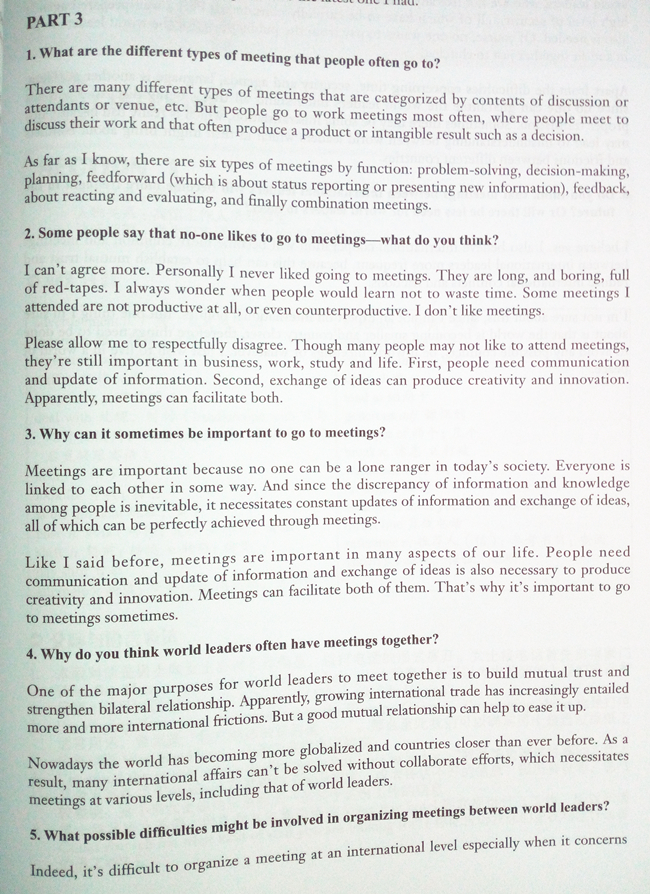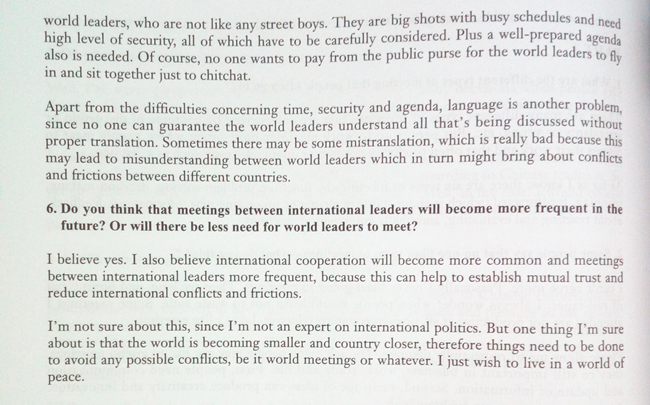剑桥雅思8口语part3范文
剑桥雅思8口语part3范文
前两篇文章我们分享了:剑桥雅思8口语Test3Part2范文:meeting话题 和剑桥雅思8口语范文Test3Part1-flowers话题。本片文章我们又给大家带来了剑桥雅思8口语part3范文。
参考答案(每个问题两个回答)
雅思口语PART 3范文:
1. Why do you think people go to restaurants when they want to celebrate something?
Honestly I don’t know. People celebrate things in many different places and restaurant is only one of them. If I really have to come up with an answer, I can only say that maybe eating some food can add to the joy of celebration.
Well, it’s easy. It’s pure biology. When you celebrate, whatever it may be, your body produces a hormone that makes you feel happy and excited. That quickly drains sugar in your blood to make energy to keep you all pumped and high. Very soon, you’ll feel hungry. That’s when you need to take some food to replenish for this lost sugar. So if you celebrate in a restaurant, you can easily do so and don’t have to worry about anything, just party on.
2. Which are more popular in your country: fast food restaurants or traditional restaurants? Why do you think that is?
I really can’t say which is more popular, because they all have their own group of customers. For example, fast food restaurants are definitely more popular among young peoples, for they tend to live a fast-paced life and fast food very well caters to that. But for older people, fast food restaurants never seem to have had a foothold, because older
peopled tend to think fast food as unhealthy or less nutritious and therefore often reject the notion of eating out in a fast food restaurant.
It’s definitely traditional restaurants. No doubts about it. Because traditional restaurants not only provide healthy eating options, but also serve as a good place for family gatherings or social functions.
3. Some people say that food in an expensive restaurant is always better than food in a cheap restaurant—would you agree?
Of course I can’t agree. Look, I know lots of restaurants that are cheap but the food there is superb; and there are also some fancy-looking restaurants where they even charge you service fee, but their food just made me speechless, I mean, in a bad way.
Kind of. In terms of environment, ingredients and service, expensive restaurants are generally better, while
admittedly there are also small restaurants that boast some secret recipes. So it’s just like the old saying puts it“you can’t judge a book by its cover”. Similarly you can’t judge a restaurant by its price.
4. Do you think there will be a greater choice of food available in shops in the future, or will there be less choice?
Honestly, I don’t know. It’s really hard to see into the future. Look, we are facing lots of crises already. Energy crisis, food crisis, population crisis, etc. I really don’t know if we are able to enjoy a greater variety of food, or food will be tubed and basically taste all the same.
Maybe, or I hope so. As the technology develops ever faster than before, new species of crops may be cultivated in field or who knows where. And food may be preserved in a better way and kept for longer time or even forever.
5. What effects has modern technology had on the way food is produced?
The use of food technology or the application of food science to everyday food processes and production has
fundamentally changed our views about food. For example, a growing number of people now believe food isn’t made with the same amount of nutrients or protein as before. The food we mostly eat today is“dead”food, so to speak. It just makes me worried.
Thanks to food technology, there are now better ways to store food for longer-lasting quality and usability. For example, the development of temperature-controlled storage spaces has paved the way for the efficient storage of perishable items, which now last longer and taste better.
6. How important is it for a country to be able to grow all the food it needs, without importing any from other countries?
It’s crucially important for a country to grow enough food for its people. When a country relies too much on imported food, a series of dangers may follow. What if the international food price rockets unexpectedly? What if a food embargo is placed on the country? There are so many what-ifs like these. So it’s better to grow food yourself.
It’s a matter of sustainability. Of course, a country must grow enough food it needs. Food security is important to any country’s future wellbeing and the world’s. And it must make sure what people eat safeguards their health.
以下剑桥雅思8口语part3范文截图来自新航道雅思真题全解8:


这个暑期,来新航道雅思封闭班 ,我们给考生的保障
签订协议,承诺不过重修,只有的雅思培训学校,才敢做出如此承诺!
自信,源于上海新航道完善的雅思培训体系
13年来,我们专心做好一件事
那就是如何让学员顺利通过雅思考试









